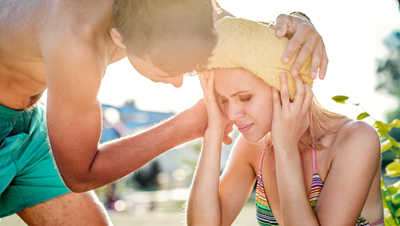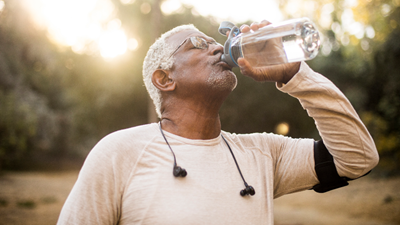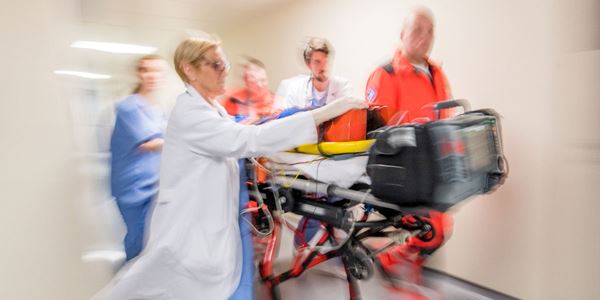Keep Your Cool! Avoid Heat-Related Illnesses This Summer
With summer in full swing, everyone wants to spend time outdoors at the pool, beach or field, having fun. But hours of fun in the sun also can result in hours of hurt from heat-related illnesses.
Florida is known for its heat—especially in summer. But it’s the humidity that can really cause problems. While a 95-degree day certainly feels hot, the temperature presents only 10 percent of stress to the body, while 70 percent of heat stress is related to humidity. A combination of sun and wind accounts for the remaining 20 percent of heat-stress factors.
Although all of these elements contribute to your body’s response, it’s important to know that you will overheat more quickly on a muggy and hot day than on a hot, but less humid day.
Your best weapon against overheating is sweat. It’s our most important aid in dissipating heat, but to be effective, sweat must be able to evaporate into the environment. That’s why it’s important to wear loose-fitting, sweat-wicking clothing when you are outside during the summer.
Types of Heat-Related Illnesses

You can experience a variety of illnesses after being outside in the heat too long.
While you may be familiar with the milder types of reactions such as heat rash, sunburn and heat cramps, it’s important to know the symptoms and treatments of the more serious heat-related illnesses.
Heat exhaustion—One of the most common forms of heat-related illnesses. Symptoms include dizziness, headache and nausea after being in the sun or
heat too long. With heat exhaustion, you may feel sick, but are still aware of your surroundings and can answer questions appropriately.
Other symptoms of heat exhaustion include:
- Heavy sweating
- Cold, clammy skin
- Fast or weak pulse
- Nausea or vomiting
- Muscle cramps
Heat exhaustion is treated by lowering the body temperature, moving into the shade or into an air-conditioned area, using ice towels to cool off and drinking water, sports drinks and non-caffeinated beverages. Heat exhaustion usually resolves within a few hours, but if it doesn’t or symptoms get significantly worse, call your doctor or visit urgent care.
Heatstroke—This condition is serious and life-threatening. It occurs when your body temperature reaches 104 degrees or higher. Without emergency intervention, your body cannot cool down, which can result in organ damage, coma and even death. Unlike heat exhaustion, heat stroke causes a dramatic change in your mental status. Those with heat stroke will not be able to answer questions appropriately, and may be confused or even combative.
Symptoms of heatstroke include:
- Hot, red, dry or damp skin
- Fast, strong pulse
- Confusion
- Losing consciousness
- Headache
- Dizziness
- Nause
Someone having a heatstroke needs emergency treatment to cool down the body. Ideally, this is done by emergency medical professionals by rapidly cooling the person in an ice bath. However, if professional help isn’t immediately available, call 911 and move the person to a cooler area and apply ice packs or towels to lower the body temperature. Do not attempt to give them anything to drink.

While heat-related illnesses are scary, they can be prevented.
- Certain medical conditions such as asthma, diabetes and high blood pressure can predispose you to being affected by the heat. Limit your time outside when the weather is hot and especially when it is humid and hot.
- Stay well-hydrated throughout the day, drinking a lot of water and sports drinks. Avoid caffeinated and alcoholic drinks.
- Seek shade and air conditioning, going inside periodically to cool down.
- Protect yourself from the sun—wear a hat, sunglasses and clothing that is light, loose-fitting, sweat-wicking and light-colored. And, of course, plenty of sunscreen.
Summertime should be fun—and with the right precautions to prevent heat-related illness, you can enjoy the hot and humid weather all season long.
Do any of these heat-related symptoms apply to you?
If you think you may be experiencing heatstroke or heat exhaustion, visit an emergency room for help. If your symptoms are severe, call 911.
Schedule Online





